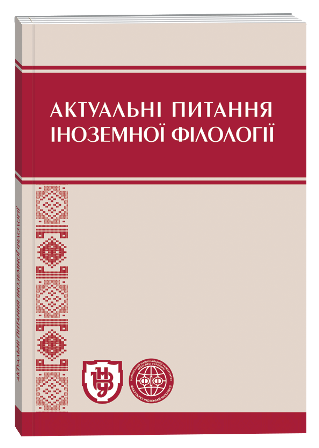TEMPORAL METAPHORS AS A TOOL FOR REPRESENTING TIME AND THEIR IMPACT ON POLITICAL ARGUMENTATION
DOI:
https://doi.org/10.32782/2410-0927-2025-22-2Keywords:
temporal metaphors, time representation, political argumentation, cognitive linguistics, metaphorical modelling, speech strategiesAbstract
The purpose of the paper is to investigate the role of temporal metaphors in the representation of time and their impact on political argumentation. The article seeks to reveal how metaphorical frames shape public perception, political narratives and decision-making, analyzing their function as tools for simplifying complex temporal concepts and facilitating emotional engagement in political discourse. The research methodology of this scientific investigation is an interdisciplinary approach combining cognitive linguistics and political communication theories. Using qualitative content analysis, it examines a corpus of political speeches and media texts from different cultural and historical contexts. The study identifies and classifies temporal metaphors, such as “time is a journey”, “time is a resource”, and “time is a cycle”, analyzing their rhetorical functions and meanings in political argumentation. The scientific novelty lies in a new perspective on the strategic use of temporal metaphors in political discourse, emphasizing their role in shaping political events, ideologies and political decisions. This highlights that temporal metaphors are not simply linguistic tools but also cognitive and cultural constructs that influence how people understand and evaluate political realities. Furthermore, the study extends the understanding of metaphorical framing by focusing specifically on temporal dimensions that remain understudied in existing research. The conclusion is that temporal metaphors serve a dual purpose: they contribute to the understanding of abstract concepts such as progress, crisis, and continuity while at the same time shaping and constraining political argumentation. Metaphors such as “moving forward” or “turning back the clock” evoke certain emotional and ideological associations, influencing the public’s perception of a certain type of politics. The study highlights the need for a critical awareness of these metaphors in political rhetoric, as they can both clarify and manipulate public discourse. These ideas contribute to developing a theoretical and practical understanding of metaphorical framing in political communication.
References
BBC News Україна. Чого нас вчать найвидатніші промови Кінга, Кеннеді і Обами. 2018. URL: https://www.bbc.com/ukrainian/vert-cul-43644875 (дата звернення: 28.01.2025).
Bougher, L. D. (2012). "The Case for Metaphor in Political Reasoning and Cognition." Political Psychology, 33(1), 145–163.
Brittanika. MAGA movement United States political movement. 2025. URL: https://www.britannica.com/topic/MAGA-movement (дата звернення: 28.01.2025).
Díez-Prados M. The use of metaphor and evaluation as discourse strategies in pre-electoral debates: Just about winning votes. Exploring Discourse strategies in social and Cognitive Interaction: Multimodal and Cross-linguistic Perspectives. Amsterdam : John Benjamins, 2016. P. 215-244
Dijk T A. van. Ideology: A Multidisciplinary Approach / T. A. van Dijk. London : Sage Publications, 1998.
Evans, V. (2004). The Structure of Time: Language, Meaning, and Temporal Cognition. Amsterdam: John Benjamins.
Hartman, K., & Husband, K. (2020). Temporal Metaphors in Climate Change Rhetoric: Creating Urgency or Complacency? Journal of Environmental Communication, 14(3), 345-359.
Lakoff, G., & Johnson, M. (1980). Metaphors We Live By. University of Chicago Press.
Mind. Грета Тунберг у Давосі: «Ви дієте так, ніби ваш дім горить, а ви вирішили дзвонити пожежникамчерез 30 років». 2021. URL: https://mind.ua/news/20221311-greta-tunberg-u-davosi-vi-diete-tak-nibi-vash-dim-gorit-avi-virishili-dzvoniti-pozhezhnikam-cherez (дата звернення: 28.01.2025).
Matlock, T., et al. (2011). "Framing Economic Recovery: Journey Versus Container Metaphors." Metaphor and Symbol, 26(3), 173–185.
Musolff, A. (2016). Political Metaphor Analysis: Discourse and Scenarios. Bloomsbury Academic.
Nerlich, B., & Jaspal, R. (2014). "Metaphors We Die By? Geoengineering, Metaphors, and the Argument From Catastrophe." Metaphor and Symbol, 29(3), 243–261.
Nisbet, M. C. (2009). "Communicating Climate Change: Why Frames Matter for Public Engagement." Environment: Science and Policy for Sustainable Development, 51(2), 12–23.
Schilperoord, J., Verhagen, S., & de Graaf, A. (2022). Nostalgia and Hope: Temporal Metaphors in Political Narratives. Discourse Studies, 24(5), 678-695.
Thibodeau, P. H., & Boroditsky, L. (2011). Metaphors We Think With: The Role of Metaphor in Reasoning. PLoS ONE, 6(2), e16782. https://doi.org/10.1371/journal.pone.0016782.








